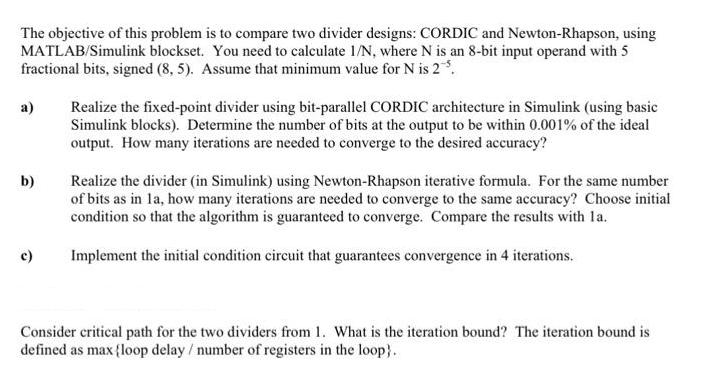Answered step by step
Verified Expert Solution
Question
1 Approved Answer
The objective of this problem is to compare two divider designs: CORDIC and Newton-Rhapson, using MATLAB/Simulink blockset. You need to calculate 1/N, where N

The objective of this problem is to compare two divider designs: CORDIC and Newton-Rhapson, using MATLAB/Simulink blockset. You need to calculate 1/N, where N is an 8-bit input operand with 5 fractional bits, signed (8, 5). Assume that minimum value for N is 2. a) b) c) Realize the fixed-point divider using bit-parallel CORDIC architecture in Simulink (using basic Simulink blocks). Determine the number of bits at the output to be within 0.001% of the ideal output. How many iterations are needed to converge to the desired accuracy? Realize the divider (in Simulink) using Newton-Rhapson iterative formula. For the same number of bits as in la, how many iterations are needed to converge to the same accuracy? Choose initial condition so that the algorithm is guaranteed to converge. Compare the results with la. Implement the initial condition circuit that guarantees convergence in 4 iterations. Consider critical path for the two dividers from 1. What is the iteration bound? The iteration bound is defined as max {loop delay / number of registers in the loop).
Step by Step Solution
★★★★★
3.44 Rating (147 Votes )
There are 3 Steps involved in it
Step: 1
a Realizing a fixedpoint divider using bitparallel CORDIC architecture in Simulink To realize a fixedpoint divider using bitparallel CORDIC architecture in Simulinkwe can use the following steps Creat...
Get Instant Access to Expert-Tailored Solutions
See step-by-step solutions with expert insights and AI powered tools for academic success
Step: 2

Step: 3

Ace Your Homework with AI
Get the answers you need in no time with our AI-driven, step-by-step assistance
Get Started


